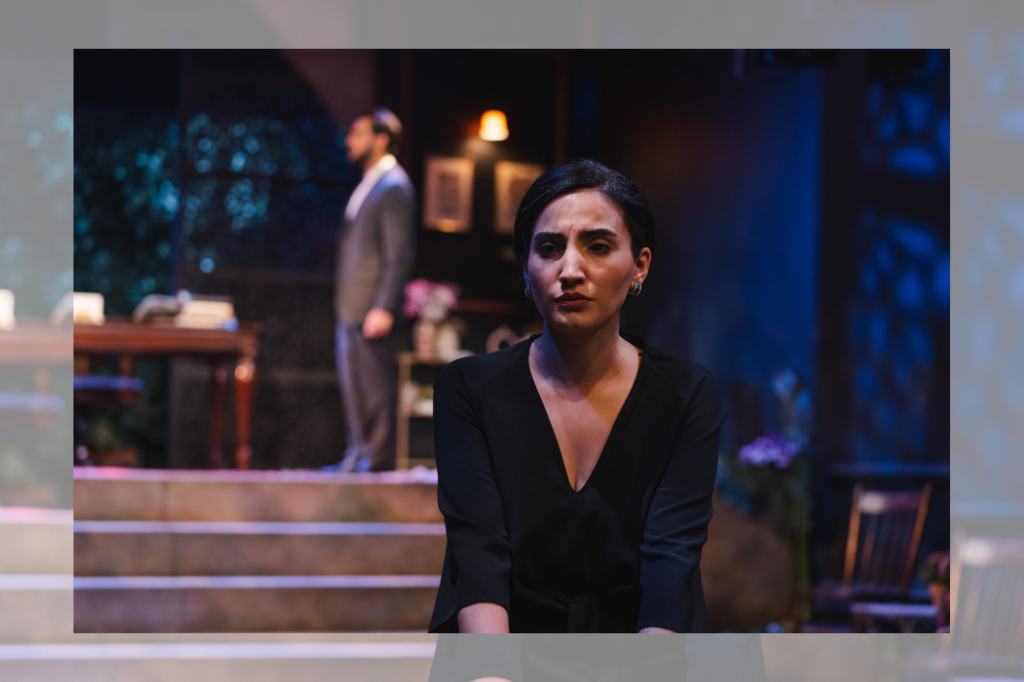REVIEW: Anahita’s Republic at Bustle & Beast
Even in the aftermath of a revolution, it can feel like nothing’s changing.
Fighting words from Bustle and Beast’s biting and brave new play, Anahita’s Republic, playing in the well-dressed Factory Theatre Studio through the end of the month. Penned anonymously by a duo of playwrights, known together by their nom de plume Hengameh E. Rice, the ninety-minute drama packs a mighty punch, spanning the gamut of attitudes towards (and embodied by) women in post-Revolution Iran.
In an hour and a half, Rice covers the recent history of Iranian women’s rights, the secret life of high-rolling smugglers in capital city Tehran, and the fact that a risky move westward might not afford the uninhibited freedom Iranian women and girls have dreamed of. Freedom and power are subjective notions, warns Rice, and escape from the regime to more socially liberal countries like England and Canada can bring unexpected consequences.
We meet Anahita (in a lovely performance by Sama Mousavi) within the walls of her luxurious compound overlooking Tehran. She wears a classy poolside ensemble of leopard print sarong and bathing suit with a plunging neckline, her hair loose and well-styled. Immediately we sense this carefree life is both taboo and much more high-stakes than it might seem — if Anahita were to wear this ensemble past the threshold of her impressive home, she’d be imprisoned for immodesty.
We soon meet her brother, Cyrus (Fuad Ahmed, showing impressive range), a member of parliament engaged in the smuggling business. He defers to Anahita in all things — at first — and lets us know almost immediately that the life he craves is that of poet, not politician. Cyrus plays the part of double agent well, encouraging Anahita’s push for women’s rights in Iran while maintaining the esteem of the Iranian government.
When a delivery of smuggled treasures — pills, poems, and bottles of alcohol — arrives at Anahita’s compound, something’s off. The delivery’s in the hands of a woman, rather than her usual father. This woman, Omid (a sweet Mahsa Ershadifar), wears the chador, as well as the less restrictive hijab, and from her first moment onstage she doesn’t seem to trust Anahita or the subversive, feminist republic she’s so intent on bringing to the surface. She wears the chador for herself, Omid says, holding the garment closed tightly. It’s only when Cyrus leaves that we’re able to see the secrets she’s keeping underneath it.
Anahita’s Republic has many of the hallmarks of a great play — tension, social message, an attractive set by Sim Suzer. But it also shows the signs of a play in progress. While the text is often affecting, funny, and poignant, it can feel a little long as it searches for its climax. Is it when Omid’s father, Masood (Omar Alex Khan) arrives? Or when he leaves? Or is it Cyrus’ outburst towards Omid, then Omid and Anahita, then just Anahita? Rice leaves us with much to ponder in this story of broken families and a struggling populace, but sometimes it arguably feels like too much, a blizzard of arguments and narratives in a cramped narrative frame.
Still, director Brenley Charkow has milked a cogent story from this chaotic world, and with four capable, compelling actors in tow, Anahita’s Republic comes to life beautifully. It’s a powerful follow to Soulpepper’s English last month, another play about Iran, its migrants, and most specifically its women — and its message is ever-timely as conflict continues to mount across Iran’s cities and towns.
Anahita’s Republic runs at Factory Theatre March 17 though April 2, 2023.















Comments